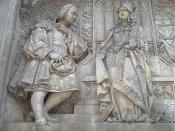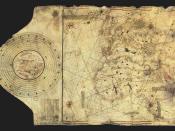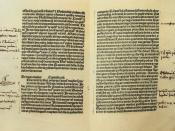Although the journals and diaries, in which Christopher Columbus is said to have recorded his discoveries, have long been lost to us and the ones that remain are not the originals, these works may not tell the whole story, or even possibly the truth of his discoveries. This essay will endeavor to explain what Columbus expected to find in the Indies, how his reports reflected these findings and the deception in what he reported back to the empire in a bid to hide his misfortunes. Upon the 'reading of Marco Polo's journals concerning his travels to China in 1170-1190 and being told of Cipangu (Japan) and other populated islands, Columbus decided to search for a faster sea route to the Far East'. Even though Columbus set out to find faster trade routes for King Ferdinand and Queen Isabella, he had an alteria motive and that was to improve his and his family' s position within the Spanish kingdom.
Columbus not only set out to discover a faster trade route through Asia, but also expected to find many commodities that would benefit himself and his sovereigns. Columbus sought trading commodities such as gold, silk and spices, which he believed would be found in large amounts throughout Asia. He also sought land to colonize and declare ownership by Spain. Columbus' third aim was to Christianise the natives of Asia, if any were to be found. Behind all of these objectives lay Columbus' true aim which was to become 'Admiral of the Sea', to gain more support for future voyages, and also to enable his descendants a better position within Spanish society. Columbus' ultimate goal was to locate the 'great Asian trading centres that Marco Polo had discovered and written about'. To find Asia, 'Christopher Columbus instructed his crew to explore directly...



O_O
this is way better than what my friend wrote. nd she got 98% =P good job. XD
2 out of 2 people found this comment useful.